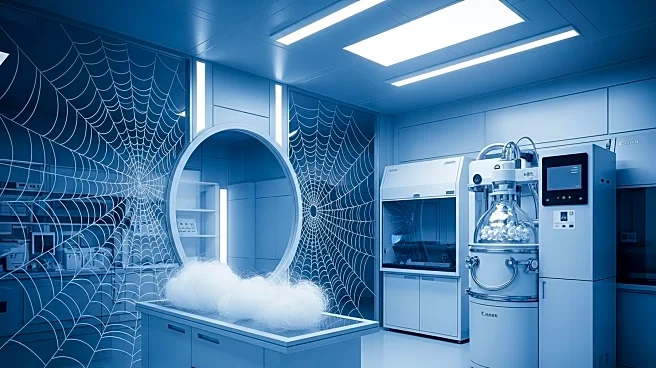What's Happening?
Kraig Biocraft Laboratories, Inc., a leader in spider silk technology, has announced a significant advancement in its recombinant spider silk production platform. The company has successfully increased production throughput through selective breeding of hybrid silkworms. The new hybrid, named BAM-1 Alpha, demonstrates a 22% increase in cocoon shell weight, marking a 245% improvement in hybrid vigor compared to the original BAM-1. This development is a result of mating genetically divergent parental strains, enhancing both cocoon size and silk output. Kraig Labs plans to integrate BAM-1 Alpha into its commercial production infrastructure, aiming to deliver high-performance spider silk fibers for various applications, including textiles, defense, medical, and industrial markets.
Why It's Important?
The advancement in spider silk production by Kraig Biocraft Laboratories holds significant implications for multiple industries. Spider silk is known for its superior strength and elasticity, making it a valuable material for high-performance applications. The increased production efficiency and reduced costs associated with the BAM-1 Alpha hybrid could lead to broader adoption of spider silk in commercial markets. This development may benefit sectors such as defense, where durable materials are crucial, and medical fields, where biocompatible fibers are in demand. The innovation underscores Kraig Labs' leadership in bioengineered materials, potentially setting new standards in the textile industry and beyond.
What's Next?
Kraig Biocraft Laboratories plans to deploy the BAM-1 Alpha hybrid across its production facilities, integrating it into ongoing manufacturing processes. The company aims to leverage this advancement to expand its market presence and explore new applications for spider silk fibers. As Kraig Labs continues to innovate, stakeholders in the textile, defense, and medical industries may closely monitor the company's progress and consider partnerships or investments. The success of BAM-1 Alpha could prompt further research and development in bioengineered materials, potentially leading to new breakthroughs in fiber technology.
Beyond the Headlines
The development of BAM-1 Alpha highlights the ethical and environmental dimensions of bioengineering. Kraig Labs' approach to enhancing natural fibers through genetic modification raises questions about sustainability and the impact on traditional sericulture practices. As the company moves towards large-scale commercialization, it may face scrutiny regarding the ecological footprint of its production methods. Additionally, the success of genetically engineered materials like spider silk could influence cultural perceptions of biotechnology, fostering acceptance or resistance based on ethical considerations.











